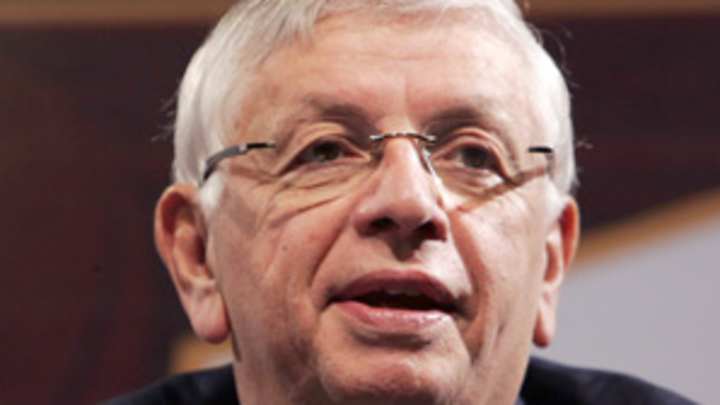NBA expected to take hard line in first proposal to union for new CBA

When the NBA hands the players' association its first proposal for a new collective bargaining agreement sometime in the next 10 days, the percentage of revenues that the league wants to give to the players will be "well below 50 percent," according to multiple league sources.
The players currently receive 57 percent of basketball-related income, and the union's executive director, Billy Hunter, told SI.com earlier this month that he thought the league was going to offer a 50-50 split.
However, sources confirmed that NBA commissioner David Stern, intent on getting the league's cost structure back in line and positioning teams so they once again can be profitable, will propose that the players get closer to 45 percent of basketball-related income. Moreover, there is a strong chance that Stern will try to redefine exactly what "basketball-related income" is so the financial onus is not so much on owners.
The biggest question the union wants answered is whether the NBA intends to roll out a low proposal at first in order to give the league room to negotiate later, or whether Stern is putting forth low percentages because that is truly what the owners expect to get.
The sides have held two formal and one informal negotiating session, the last coming in mid-December. Hunter, who did not return calls for this story, told SI.com on Jan. 8 that he anticipates receiving a proposal from the league at the end of January, enough time to allow the players to absorb the information before another formal session during All-Star weekend in Dallas on Feb. 12.
"They obviously indicated what their concerns are, how they feel they are being impacted economically," Hunter told SI.com three weeks ago. We looked at it. We don't necessarily agree with their interpretation of the facts and numbers. Their primary concern is that the percentage of the revenues that the players are receiving is too high under the current economic circumstances.
"I would suspect they would like to see it somewhere closer to 50-50. I don't want to give any indication where I am. But clearly I am nowhere near anybody's 50-50. Where I am is I propose we extend the current deal. I have already offered that to the owners."
The sides have until June 30, 2011, to work out a deal, after which the league likely would impose a lockout of its players. A drastic decline in the players' percentage of BRI would increase the chances of an ugly lockout, similar to the one that robbed the NBA of 32 games during the 1998-99 season.
SI.com has learned, however, that even if the owners impose a lockout, they will continue to be paid the revenue from their television contracts with ABC and Turner Sports, a figure that amounts to close to $900 million, or $30 million per owner. Under that scenario, with no player salaries and in some cases no coaching salaries, some teams will actually make more money by not playing under the current economic conditions. Many teams already are organizing their budgets in preparation for a potential lockout.
But the union is quick to point out that the league must at some point pay back the money to the networks -- probably by extending the contract for a year -- so it is not free money. Still, the television money will help prop up the owners during any work stoppage, while the players are left on their own.
"We are saving our money for ours and they are going to be able to profit while we are out. Wow, this is going to be a bloody battle," said Warriors forward Devean George, the team's player representative, who plans to attend the meetings in Dallas. "I'm curious to see what Billy has to say after his talks with the commissioner."
Sources also said Stern is committed to holding players more responsible for their actions, particularly in light of the recent suspensions of Gilbert Arenas and Javaris Crittenton after they had guns in the Wizards' locker room. Owners -- particularly the newer owners -- have tired of seeing players get paid their guaranteed contracts regardless of their actions both on and off the court, sources said.
Stern has indicated in the past that he would like to get a new collective bargaining agreement done sooner rather than later because his preference is to have the new guidelines in place for 2010-11. One source indicated there is a chance the union will simply walk away from negotiations altogether if the league's first official proposal is not even remotely palatable to the players.
Another issue is how the league will get the players' percentage of basketball-related income down to 45 percent when many players' salaries are already inflated. Common sense says the NBA would follow the same path as the NHL and phase in a hard salary cap, which would include an escrow account that would require players to pay back owners a predetermined amount at the end of each season.
"Damn. What is that, 12 percent lower?" George said. "Shoot. Well, save our money and just get ready to knuckle up, I guess."
PREPARING FOR LOCKOUT:Hunter fears the worst
